Administrator (Part Time)
Administrator (Part/Time)
Summary
A part-time administrator is required to help support the thriving I Love to Learn Professional Tuition after-school tuition centres; in Havant, Fareham and Portsmouth. Hours are flexible during daytime or early evening.
Communication
- Internal-e.g. emails and calls to customers
Missed sessions and catch up sessions
- External-e.g. letter and emails to schools
Finance
- Recording payments-non-automatic
- Following up late payments
- Updating financial records
Data Management
- Keeping Calendar and database up to date
- Updating management data
Qualifications and Education Requirements
DBS cleared
Customer service skills
Ability to work independently
Verbal communication skills
Attention to detail
Numeracy and literacy skills
Salary and Hours
Hours to be negotiated, but minimum of 6 hours a week initially
£10.50 per hour (depending on experience)
Job Advert Form (1)
Form for Potential Employees to Respond with
Summer School 8th -12th August 2022 Fareham Centre
Maths and English Fun in Fareham
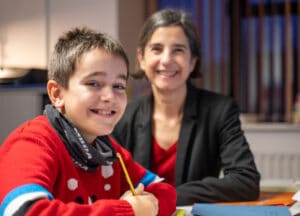 Summer will soon be here and we are offering a Summer School in our Fareham Centre! Each student receives 10 hours of professional tuition with fully qualified teachers. Some children stay in the afternoon for sport activities at the John Pounds Centre in Portsmouth. Transport will be provided.
Summer will soon be here and we are offering a Summer School in our Fareham Centre! Each student receives 10 hours of professional tuition with fully qualified teachers. Some children stay in the afternoon for sport activities at the John Pounds Centre in Portsmouth. Transport will be provided.
During the week our tutors are able to give each child a really good boost in maths or English. As they are not at school we can teach longer sessions each day (2hrs). This allows us to focus on a smaller number or skills to really work on. Summer School is always a really fun and positive experience with children getting lots of stamps and stickers and feeling they really have made a lot of progress! Many of our families enjoy it so much they come back year after year!
Some children will want to stay in the afternoon to do the sport programme. Children will be transported to and from the John Pounds Centre each afternoon. We are again collaborating with Michael Whitelock at Go Active Camps who we have worked with many times before.. The morning tutoring is run by our experienced tutors in the John Pounds Centre IT Suite. After that the children have a full programme of games and activities designed to boost their physical, social and cooperative skills.
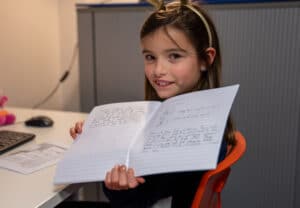
Summer School 8th -12th AUGUST
Ages 6-16 years
*Early Bird Price for 9-3.30pm Tuition and Sport £300 £270 or Tuition only £235 £220*
Tuition: Maths & English 9-11am or 12-2pm Cost £235 £220 6-16yrs
A full ten hours of professional tuition in reading, writing, spelling and maths to boost your child this summer. Individual plans and all abilities catered for. Classes in our Fareham Centre.
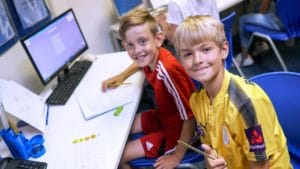
Tuition and Sport*: Maths & English Tuition + Sport & Games 9am-3.30pm Cost £300 £270.
Sport*: Sport & Games and other activities with fully qualified coaches from Go Active Camps at the John Pounds Centre, Portsmouth.
*Transport is available to take students from the Fareham Centre and back to John Pounds Centre for the sport activities.
*Early Bird Price £300 £270 pay by May 31st*
 Gain Confidence
Gain Confidence
For children who have struggled in school, summer is an invaluable opportunity to catch-up on key skills and feel more confident when they return to class. For students who do well, it is an opportunity to keep their enthusiasm for learning high.
If your child needs help with reading, writing, spelling or maths call Howard or Linda for a free assessment on 023 93 96 86 26 now.
Summer School 15th -19th August 2022 John Pounds Centre
Maths and English Fun at Summer School
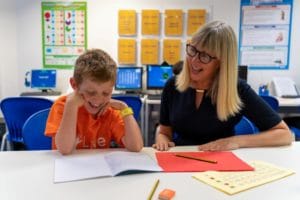 Summer will soon be here and Summer School 2022 is here by popular demand! Each student receives 10 hours of professional tuition with fully qualified teachers. The children stay in the afternoon for sport activities.
Summer will soon be here and Summer School 2022 is here by popular demand! Each student receives 10 hours of professional tuition with fully qualified teachers. The children stay in the afternoon for sport activities.
We are again colaborating with Michael Whitelock at Go Active Camps and the John Pounds Centre. The morning tutoring is run by our experienced tutors in the John Pounds Centre IT Suite. After that the children have a full programme of games and activities designed to boost their physical, social and cooperative skills.
 During the week our tutors are able to give each child a really good boost in maths or English. As they are not at school we can teach longer sessions each day (2hrs). This allows us to focus on a smaller number or skills to really work on. Summer School is always a really fun and positive experience with children getting lots of stamps and stickers and feeling they really have made a lot of progress! Many of our families enjoy it so much they come back year after year!
During the week our tutors are able to give each child a really good boost in maths or English. As they are not at school we can teach longer sessions each day (2hrs). This allows us to focus on a smaller number or skills to really work on. Summer School is always a really fun and positive experience with children getting lots of stamps and stickers and feeling they really have made a lot of progress! Many of our families enjoy it so much they come back year after year!
Summer School 15th -19th AUGUST
Ages 6-12 years
*Early Bird Price for 9-3.30pm Tuition and Sport £300 £270*
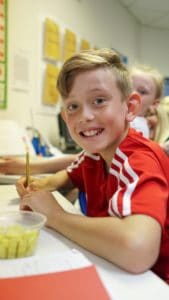 Tuition & Sport
Tuition & Sport
Maths & English 9-11am
A full ten hours of professional tuition in reading, writing, spelling and maths to boost your child this summer. Individual plans and all abilities catered for.
Sport and Games and other activities with fully qualified coaches from Go Active summer camps until 3.30pm.
Learn some new skills, cooperation and coordination.
Classes are held at the John Pounds Centre, Portsea.
*Early Bird Price £300 £270 pay by May 31st*
Many Children Fall Behind
‘Research shows as many as one in three children can fall behind as a result of a seven-week break from the classroom.’
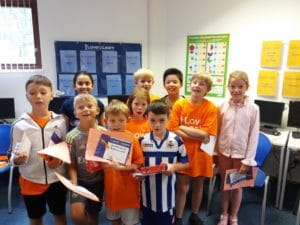
For most children, summer is a time to leave classes and homework behind. While summer is a holiday from school, it does not have to be a holiday from learning. The summer holiday is great for recharging your children’s batteries, but if they are not using the skills and knowledge that was learned in the classroom, they will find themselves struggling when school starts up again.
Skills and knowledge gained throughout the school year fade during the summer months. Research shows that loss of content retention begins within 24 to 48 hours of learning unless the new information is reinforced or applied immediately. That is why, during summer holidays, even the best students forget lessons they have learned during the school year. After a month without reinforcement, approximately 80 percent of what a student has recently learned can be lost.
Gain Confidence
For children who have struggled in school, summer is an invaluable opportunity to catch-up on key skills and feel more confident when they return to class. For students who do well, it is an opportunity to keep their enthusiasm for learning high.
If your child needs help with reading, writing, spelling or maths call Howard or Linda for a free assessment on 023 93 96 86 26 now.
Request a Call Back
Teach your child Handwriting-getting started
In this video I explain how to write lower case letters. At I Love to Learn Professional Tuition we teach cursive (or joined up) writing right from the beginning. I start with writing letters that begin with vertical strokes e.g. i, t, l, p and m This is suitable for parents wishing to help their child with the basics of joining up ( cursive) handwriting. However, it can also be used by all those who would like to improve their handwriting style.
Teach Your Child Fractions-Improper Fractions and Mixed Numbers
In this video I explain how to convert improper fractions into mixed numbers. This is a topic that can often cause confusion, mainly because of the terms being used. I suggest that it is usually helpful to draw a diagram of the improper fraction or mixed number that you are trying to convert.
This is suitable for parents wishing to help their child with topics they may have forgotten.
Click here to download the worksheets…..
To find out more about how we teach maths click here.
Helping Your Child With Post Lockdown
Have a House Meeting
It is a good idea to ask your child to write a list of questions that concern them about returning to school. This is an opportunity to re-assure them that, thankfully, Covid 19 has actually harmed very few children. Write an agenda with the points you want to discuss, and allow the children to add to it.
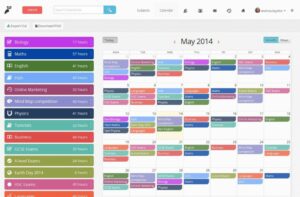 Agree a Plan
Agree a Plan
Remember all those things you wished you hadn’t let go during lockdown? Now is the time to set up a new routine with regular meals, homework, chores and leisure time. Habits are essential to regulate our moods. This will help them feel more secure and in control.
Talk to the Teacher (especially if it is a transition year)
Take any opportunity to talk to the teacher or school about your child’s special needs, personality, strengths and weaknesses. This may be a challenge, due to Covid 19 restrictions, but not to be overlooked. Understanding a child usually helps teachers teach that child more effectively. It is a good idea to get the children on the teacher’s radar if you have major concerns. One of my own children experienced some ‘extra’ anxiety going up to secondary school. We made sure we spoke to the SEN (special educational needs) Coordinator and got them, some extra visits to the school, to familiarise himself. They then showed us around as if they owned it!
Click here to book your free post lockdown assessment
Less Screen Time More Park
Many children have had very little contact with their friends. More introverted children may be exhausted from returning to school and many may take some time to adjust. I would expect a few ups and downs as children get used to meeting real people again and re-learn the social skills they may have forgotten.
Try Something New
Children will look to us to set the mood. We have all experienced stress and maybe loss during the lockdown. A positive ‘we can do this’ is the best attitude. This time will pass, and we will overcome together.
 Be Prepared
Be Prepared
Practical preparations are important to help the child get ready mentally. A new uniform or bag might seem a small thing, but it can help your child imagine themselves into their return. It may also be a good opportunity to talk through their hopes and fears.
Be Realistic
Having 6 months of no school is not going to be corrected overnight! It may be quite some time before children have caught up with where they need to be. For some of the weaker students it may be necessary to seek out extra support.
All change is stressful even if it is ‘good’ change. I would encourage all parents and teachers to normalise the situation as much as possible, while being sensitive and thoughtful about the adjustments needed. A bit of extra down time, a good routine and a few extra hugs will go a long way.
Never Stop Learning-Summer Fun
AVOID SUMMER LEARNING LOSS
For most children, summer is a time to leave classes and homework behind. While summer is a holiday from school, it does not have to be a holiday from learning. The summer holiday is great for recharging your children’s batteries, because if they are not using the skills and knowledge that was learned in the classroom, they will find themselves lagging behind when school starts up again.
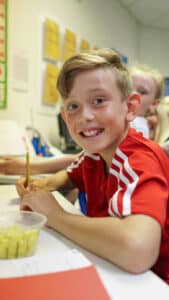 When they return to school in September after the long summer break, students can find themselves struggling to catch up. Skills and knowledge gained throughout the school year fade during the summer months. At I Love to Learn, we have found that loss of content retention begins within 24 to 48 hours of learning unless the new information is reinforced or applied immediately. That is why, during summer holidays, even the best students forget some of the lessons they had learned during the school year. After a month without reinforcement, approximately 80 percent of what a student has recently learned can be lost.
When they return to school in September after the long summer break, students can find themselves struggling to catch up. Skills and knowledge gained throughout the school year fade during the summer months. At I Love to Learn, we have found that loss of content retention begins within 24 to 48 hours of learning unless the new information is reinforced or applied immediately. That is why, during summer holidays, even the best students forget some of the lessons they had learned during the school year. After a month without reinforcement, approximately 80 percent of what a student has recently learned can be lost.
Now it is also true that children do need a break to rest and do other things. In fact most learning does rebound after the holiday to overtake the previous level.
For children who have struggled in school, summer is an invaluable opportunity to catch-up on key skills and feel more confident when they return to class. For students who do well, it is an opportunity to keep their enthusiasm for learning high.
Click here to find out about our Summer Lessons…
FUN SUMMER LEARNING TIPS
We never stop learning so here are some ideas to help encourage our children’s learning and have some fun this summer.
Learn about time: allow children to be the family timekeeper and get them to wear a watch every day.
Learn about money: do a car boot sale with your children or they could start their own business (e.g. making and selling lemonade).
Learn about measurement: read recipes, use scales and cook delicious food together.
Learn about the past: by letting them interview grandparents or an elderly neighbour. This can really bring ‘history’ to life.
Improve your writing: by encouraging them to keep a diary every day. Children can maintain their writing skills and capture many memories for the future.
Practice your reading: Take part in the Library Service reading challenge which rewards children for reading a minimum number of books.
Also, as the new school year approaches it may be useful to discuss routines and agree how to organise time, work and anything else which need to be done.
Finally, if they still complain about being bored, try saying “well I guess I haven’t given you enough chores yet!” and see what happens.
Summer Learning Loss can be significant:
Blasting Through to the Next Level!- School Transition
Blasting Through to the Next Level!-School Transition
Top 5 Concerns for Parents
-Bullying
-Safety
-The amount of homework
-Adjusting to having lots of teachers
-Making new friends
Top 5 Concerns for Children
-Getting Lost
-Losing old friends
-Homework
-Discipline and -detentions
-Being bullied
(UCL Research)
Pupil and Parent Concerns
Many of our little superheroes will soon be pushing through to the next level at school. This may be a transition between Infant to Junior or Junior to Senior. Even changing year groups can be hard for younger children.
Do you remember the feeling of excitement and fear of going up to a new class or school? I certainly remember it being scary and stressful!
Now is a good time to talk to your kids about these changes. Fear of the unknown is the worst thing, especially for imaginative young minds.
Helping with Transition
It is a good idea to ask your child to write a list of questions themselves. Although you never know what their concerns might be, they may include some of the things listed above.
Take any opportunity to talk to the new teacher or school about your child’s special needs, personality, strengths and weaknesses. Understanding a child usually helps teachers teach that child more effectively. It is a good idea to get the children on the teacher’s radar if you have major concerns e.g. a special need.
One of my own children experienced some ‘extra’ anxiety going up to secondary school. We made sure we spoke to the SEN Coordinator and got them some extra visits, to the school, to familiarise himself. They then showed us around as if they owned it!
Practical preparations are important to help the child get ready mentally. A new uniform or bag might seem a small thing, but it can help your child imagine themselves into their new role. It may also be a good opportunity to talk through their hopes and fears.
Good News
The good news is that most of these fears reduce very quickly, and mostly go away, by the end of year 7. In fact only 3% of children are worried after a term at Secondary School (according to a University of London study). Most students are ready to develop new friends and their interest in their schoolwork increases. Our experience as parents has been very positive. It has been a (mostly) exciting and rewarding journey so far!
For further resources see: www.ucl.ac.uk/stars Stars Booklet for Pupils on Transition
www.ioe.ac.uk/projects/eppe
Is Maths Anxiety a Thing?
Did you hate maths at school? Do you feel you “can’t do maths?” You may not be alone.
Recently researchers claimed that “Maths Anxiety” is real. One in 10 children suffer from despair and rage when faced with the subject, according to new research from Cambridge University’s Faculty of Education and its Centre for Neuroscience. Click here to read more…..
Could this be just another made up term to excuse poor attainment or could working with numbers really be a cause of exceptional unhappiness for children?
As a tutor, I have certainly come across lots of students who ‘hate’ maths. Some of them seem to have genuine problems with remembering and manipulating numbers. Many of them, however, do seem to make remarkable progress when they realise they can do maths after all.
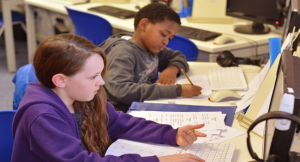
Why Maths?
Stress or anxiety about any subject is obviously an impediment to learning. Is maths so different? I suspect people learn to like or dislike maths for the same reasons. When you are leaning maths the answers you give are either right or they are wrong, unlike other subjects perhaps, so if you are getting it wrong the feedback is rather immediate. If students fear failure or ‘getting it wrong’ it could make early negative experiences particularly unpleasant and overwhelming. So, for example, finding fractions difficult in primary school may lead to enough wrong answers and unhappiness to convince some children that maths is something they ‘can’t do.’
I always say that maths is like a house, you have to build the foundation first, before you build the walls. If students have switched off at some point in their school careers, then they have not built a firm foundation. All the maths they are taught after that will become much harder because they have not learned the basic skills, such as times tables or place value. This can lead to students getting very stuck unless they find a way to fill in the gaps.
This is a serious problem as STEM (science technology engineering and maths) careers rely on high levels of maths fluency and attract higher than average salaries.
Stress Reduction

Learning anything while being anxious is not helpful. Increased levels of anxiety use up working memory and stop learning from taking place. Most people find it much harder to remember appointments if they have an exceptionally stressed day at home or the office.
As a tutor, I always give students work that they can do (i.e. easy enough for them but not too easy) so that they get most of their answers right. When they begin to feel relaxed, I can then start introducing new topics strengthening their weaker areas.
In addition, learning times table by rote, may seem old fashioned, but it makes maths so much easier. Try reading a new language when you don’t know all the alphabet and have to look them up each time. Much slower and much less fluent. We try to do activities, such as lots of number bonds and tables, that don’t require much working memory and are highly repetitive.
The third approach is to change the mindset of anxious learners. Maths is actually a subject that requires a lot of practice and repetition, but if people put in the hours almost everyone can improve. A bit like jogging, everyone can do it, rather than fine art when you need a high level innate skill. So rather than having a ‘fixed mindset’, i.e. some people can do maths and some people just can’t; students need to adopt a ‘growth mindset’ i.e. “I can do it if I try.”
Finally, parents can make maths more fun by putting away the study books and getting out some games. Card games and dice games (yes the dreaded Monopoly) can make numbers relevant and fun. At a younger age, using blocks such as lego can help with number, fractions, counting and shapes. The abacus is an ancient tool which is still helpful today.
Learning to Love Maths
Anxiety about maths is certainly a problem for many people, but it can be overcome. The more people worry about it, the bigger it can grow. Sometimes a few deep breathes and a chance to express themselves, then reframe these fears, can make a big difference.
Many people have found that when they have come back to maths learning later in life they have actually enjoyed it! Making maths fun can be a good way for both fearful parents and children to help each other overcome anxiety.
Summer School 19th -23rd August 2019
Maths and English Fun at Summer School
Summer will soon be here and Summer School 2019 is here by popular demand! Each student receives 10 hours of professional tuition in a week. Some children stay in the afternoon for sport activities.
Summer School 19th -23rd AUG
*Special Early Bird Discount, £250 for Tuition and Sport if booked by end of June.*
Tuition: Maths & English 9-11am or 12-2pm Cost £205 6-16yrs
A full ten hours of professional tuition in reading, writing, spelling and maths to boost your child this summer. Individual plans and all abilities catered for. Classes in our Portsmouth and Fareham Centres.

Tuition and Sport*: Maths & English Tuition + Trampolining/Gymnastics 9am-3pm
Sport*: Trampolining, Gymnastics and other activities with fully qualified coaches from PSTGC
Learn some new moves and gain a badge and certificate at the end of the week! (Usually £90)
*Transport is available to take students from the Fareham Centre and back to Priory Tennis for the sport activities.
-Save £35 by booking both Sport and Tuition-
Cost was £295 only £260 6-12yrs
*Special Early Bird Discount, £250 for Tuition and Sport if booked by end of June.*
Many Children Fall Behind
‘Research shows as many as one in three children can fall behind as a result of a seven-week break from the classroom.’

For most children, summer is a time to leave classes and homework behind. While summer is a holiday from school, it does not have to be a holiday from learning. The summer holiday is great for recharging your children’s batteries, but if they are not using the skills and knowledge that was learned in the classroom, they will find themselves struggling when school starts up again.
Skills and knowledge gained throughout the school year fade during the summer months. Research shows that loss of content retention begins within 24 to 48 hours of learning unless the new information is reinforced or applied immediately. That is why, during summer holidays, even the best students forget lessons they have learned during the school year. After a month without reinforcement, approximately 80 percent of what a student has recently learned can be lost.
Gain Confidence
For children who have struggled in school, summer is an invaluable opportunity to catch-up on key skills and feel more confident when they return to class. For students who do well, it is an opportunity to keep their enthusiasm for learning high.
If your child needs help with reading, writing, spelling or maths call Howard or Linda for a free assessment on 023 93 96 86 26 now.
Request a Call Back



